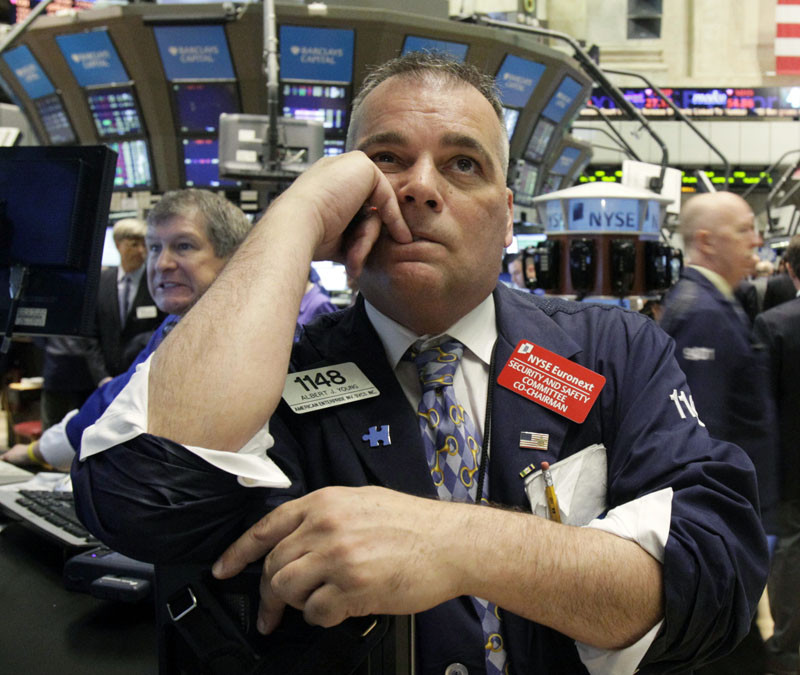NEW YORK — The stock market has had another seesaw day. Stocks fell sharply in early trading on a series of troubling economic and political developments, then recovered late in the day.
The turnaround came as bank stocks rallied in response to comments by Rep. Barney Frank. The Massachusetts Democrat indicated Congress may pass a mild version of the financial overhaul bill that lawmakers are now negotiating.
While the market’s comeback was impressive, it is still vulnerable to sharp drops on concerns about Europe’s debt problems.
The Dow Jones industrials closed with a loss of 22, or 0.2 percent, at 10,043. The Standard & Poor’s 500 index rose less than a point, or less than 0.1 percent, to 1,074. The Nasdaq composite index closed down 2, or 0.1 percent, at 2,210.
About three stocks fell for every two that rose on the New York Stock Exchange. Volume came to 1.9 billion shares.
3:32 p.m.
NEW YORK — The Dow Jones industrials plunged below 10,000 today after traders dumped stocks on expectations that the world economy will weaken in the coming months.
The Dow fell about 200 points in afternoon trading. It has fallen about 1,340 points, or nearly 12 percent, from its recent high of 11,205, reached April 26. The Dow and broader stock indexes all fell about 2 percent.
Investors also exited the euro and commodities including oil and again sought safety in Treasurys. That drove interest rates lower. The benchmark 10-year note’s yield fell to its lowest level since April 2009.
Investors were anxious about problems beyond the financial crisis in Europe. Tensions between North and South Korea reminded traders that political issues can be a threat to economic growth. And analysts said that even the still unresolved oil spill in the Gulf of Mexico contributed to investors’ foul mood.
Still, uncertainty over the impact that Europe’s debt problems could have on the rest of the world in the coming months remains the biggest driver of investor pessimism, said Jonathan Corpina, president of Meridian Equity Partners. The largest concern is that painful austerity measures that European governments are being forced to take could lead to a prolonged economic slump in the region and cause another global recession. And investors fear that even those measures won’t contain the crisis, Corpina said.
“It seems like the Europeans are playing ‘tag, you’re it ‘ – first it was Greece and now it’s maybe Spain or Portugal,” said Corpina, a New York Stock Exchange floor trader. “We know someone else is next. The problem is that it seems like every plan in place isn’t going to satisfy the needs.”
A warning of hard times came from Britain’s Queen Elizabeth, who opened the new session of Parliament with a speech delivered on behalf of Britain’s new coalition government. The queen, said there would be budget cuts because “the first priority is to reduce the deficit and restore economic growth.”
Other European countries are imposing budget cuts as well, trying to control their debts. Investors are concerned that these steps will stifle economic growth, and that other countries including the U.S. will inevitably see their own growth stunted.
European Union leaders warned today that the continent’s economy would stagnate unless governments make major reforms to promote growth. The problem is, though, that large debts in some countries make it difficult to implement stimulus measures to rally economies.
Send questions/comments to the editors.



Success. Please wait for the page to reload. If the page does not reload within 5 seconds, please refresh the page.
Enter your email and password to access comments.
Hi, to comment on stories you must . This profile is in addition to your subscription and website login.
Already have a commenting profile? .
Invalid username/password.
Please check your email to confirm and complete your registration.
Only subscribers are eligible to post comments. Please subscribe or login first for digital access. Here’s why.
Use the form below to reset your password. When you've submitted your account email, we will send an email with a reset code.